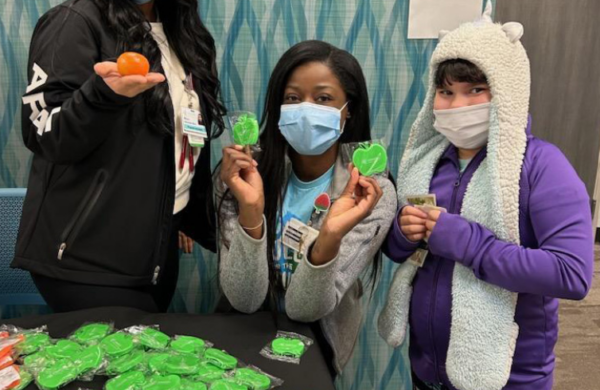[caption id="attachment_29958" align="alignleft" width="481"]
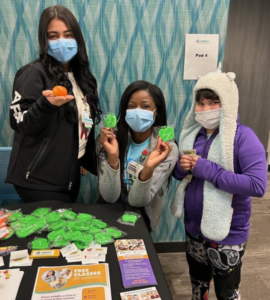 Young patients at CMC visit a table the health center has set up (CMC Facebook)
Young patients at CMC visit a table the health center has set up (CMC Facebook)[/caption]
The pandemic upended
Community Medical Centers’ plans to roll out an adverse childhood experiences (ACEs) screening program in California's Central Valley, famed as the "food basket of the world" for its produce. As in many other safety net clinics, screening “was a rollercoaster,” says CMC’s chief of behavioral health Alfonso Apu. The initial rollout was halted by the COVID-19 pandemic, staff shortages, and a soaring need for behavioral health services, as well as the retirement of a longstanding manager and difficulty finding the right employee to lead the charge for trauma screening.
But after a few months, an internal champion for the program emerged, and the Central Valley-based center was able to start making significant progress tackling this critical program area. Maria Moreno, a pediatric medical assistant in CMC’s Vacaville clinic for a dozen years, seized the opportunity to bring the program back on track as the trauma informed case manager and care coordinator. Kudos to Moreno, says Apu, who adds that she has been a stable, central force since taking over in February 2022.
To begin with, Moreno was already well known to the healthcare team and families alike. On the clinic end, she is familiar with CMC’s procedures, workflows, and electronic health record (
Next Gen Healthcare) which was a huge help in launching ACEs screening on site. (CMC uses both NextGen’s internal ACEs screener and PEARLS—which stands for
Pediatrics Adverse Childhood Experiences (ACEs) and Related Life Events Screener).
[caption id="attachment_29980" align="alignright" width="454"]
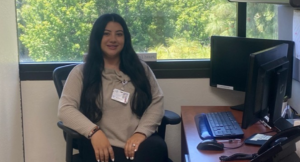 Maria Moreno, a CMC medical assistant and childhood trauma screening champion
Maria Moreno, a CMC medical assistant and childhood trauma screening champion[/caption]
In terms of patients and parents, the bilingual Moreno is a familiar, friendly, and welcoming face. She offers continuity, calmness and a sense of safety in a frequently fast-paced clinic environment. She’s able to interact in English and Spanish during ACEs screening at multiple touchpoints: with front office staff at the reception desk, medical assistants on the floor, in the provider’s room and the behavioral health staff’s office, and with patients and their families in the waiting area and beyond. For both the clinic and families, it is a win-win.
“We are committed”
CMC providers, who have undergone
ACEs Aware training, have been on board to screen for ACEs for several years, says Apu. The California initiative is a first-in-the nation effort to screen patients for ACEs statewide to help improve and save lives. Healthcare teams understand the need, since it walks through their doors every day: ACEs affect nearly two million children in California across socioeconomic lines, putting them at risk for health, behavioral, and learning problems.
ACEs are traumatic childhood experiences – including abuse, neglect, and exposure to violence, mental illness in the home, a parent’s death or incarceration, and substance use disorders - that create
toxic stress that can flood both the body and brain with stress hormones. This over-activation of the stress response
disrupts brain architecture and increases
immune system inflammation, which can lead to health, learning, and behavior problems as well as
chronic disease and/or mental illness across the lifespan. The more ACEs a child has experienced, the higher their risk climbs.
[caption id="attachment_29981" align="alignleft" width="590"]
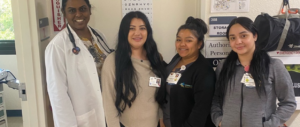 CMC care team (L-R) :Shami Prasad-Clerve, NP ; Maria Moreno, medical assistant; Alexa Garcia, medical assistant; and Verenice Rodriguez, medical assistant
CMC care team (L-R) :Shami Prasad-Clerve, NP ; Maria Moreno, medical assistant; Alexa Garcia, medical assistant; and Verenice Rodriguez, medical assistant[/caption]
“I think our pediatricians really bought in since the beginning -- as an agency we are committed to trauma-informed care concepts,” says Apu, noting that it was more a question of having the right resources in place to do screening and follow-up. Having Moreno on board removed barriers to implementing the screening and post-screening care, and her new role reinforced the importance and value of this work.
Some health team members, though, initially expressed concern that ACEs screenings might be akin to opening a can of worms. They worried they would be ill-equipped or too short on time to be able to support patients who screened positive. “I tell them: don’t worry about that, a patient’s’ can of worms has been open for years -- you’re not opening anything,” Apu says. “You’re providing that patient an opportunity to actually feel safe and bring a concern to light.” The intent is to create an environment where people feel comfortable about not only screening but talking about their trauma, he adds. “Patients that come to CMC understand that if they have a behavioral health issue or toxic stress, we’re here to help them, normalize their issues and reduce any stigma.”
Developing relationships, accessing support
[caption id="attachment_29954" align="alignleft" width="492"]
 Community Medical Centers was originally started in the late 1960s to serve the farmworker community of the Central Valley (Shutterstock)
Community Medical Centers was originally started in the late 1960s to serve the farmworker community of the Central Valley (Shutterstock)[/caption]
Community Medical Centers, which began as a farmworker clinic in the 1960s, has grown into a network of 27 neighborhood health centers serving over 111,000 patients in San Joaquin, Solano, and Yolo Counties, making the organization one of the area’s largest safety net providers. The federally qualified health center (FQHC), which
historically served mostly migrant agricultural workers and their families, offers integrated medical, dental, behavioral health, and supportive services, using a model that puts the patient at the center of the care team. Today, the clinics also serve a significant unhoused population, as well as community members with substance use disorders and/or severe mental illness. Almost all CMC patients are low-income; one third need care in a language other than English and many are uninsured.
As part of CCI’s Resilient Beginnings Network (RBN), the center is working to bolster its trauma-informed care with pediatric patients in the Central Valley. CMC is currently doing pediatric ACEs screenings at four locations, including in Stockton, Lodi, and Vacaville, where Moreno works. The center screens patients from newborn to 18 years old at all appointments: well and sick in-person visits.
For patients who aren’t able to come in, miss appointments or no show, Moreno schedules a telehealth call for both screenings and follow up. If a family needs help with the screening questionnaire, Moreno offers support. With the care team staff, she makes sure coworkers follow through on documentation in the electronic health record (EHR). Moreno follows up with positive patients with introductions to behavioral health providers and other specialists and connects patients to support services. To date, CMC has screened more than 2,500 pediatric patients. Almost 22 percent of those patients screen positive for at least one ACE, according to the organization.
[caption id="attachment_29959" align="alignright" width="445"]
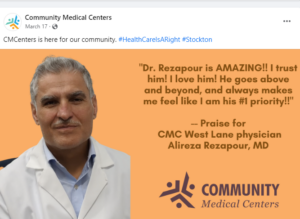 CMC patients have high praise for their providers, (CMC Facebook)
CMC patients have high praise for their providers, (CMC Facebook)[/caption]
This kind of thoughtful and thorough care coordination extends beyond the trauma-informed ACEs criteria and includes social needs that patients have difficulties addressing.
Many families who screen positive for ACEs, explains Apu, also have unmet needs— for food, housing, transportation, employment, and/or health insurance. They may need assistance around domestic or intimate partner violence or access to recovery services. Moreno tries to help with it all. “The feedback we get from patients is often along the lines of ‘nobody has ever asked me that before,’” says Apu. “They don’t feel judged. They feel like they’re being treated as human beings, and Moreno builds relationships an
d develops a bridge with these families to help get their needs met.”
Creating resilience for patients and practitioners
Moreno says that parents of teenagers are especially grateful for the support—including referrals to therapists. Meanwhile, patients reveal their resilience in different ways. Moreno mentions an adolescent who tested positive on screening to a question about sexual abuse. “He circled some things and then he wrote a note on the side that said ‘but nobody knows,’” explains Moreno. “That to me right away was something [so important] that I went straight to the provider, and we had a conversation,” she says. “The patient had already left the clinic.” She had a follow-up talk with the patient, offering behavioral health services, “but he said, ‘No, I’m fine.’”
Still concerned, Moreno touched base with a CMC social worker to consider what else she might do. That’s when she hit pause. “I felt like the teenager felt supported, even just by mentioning it to anybody. That it was some kind of relief that he brought up something that happened 10 years ago,” she explains. “It was an environment—the clinic, the provider, or me—where he felt he could write that down without any judgment. He has my number and [behavioral health’s number], so he can engage with us at any time if he changes his mind. It’s an example of opening the door on a conversation and meeting a patient where they are at.”
Building trust and developing empathy is key. “We know with our patients you don’t want to push them too much towards making that appointment with behavioral health or opening up right away,” she continues. “You want to give them that time to open up, because it is trauma they have had for years. And sometimes they don’t know how to let go or they just need time. The main thing is that they know they can get help with those things.”
[caption id="attachment_29960" align="alignleft" width="468"]
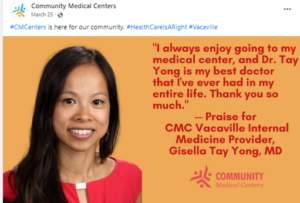 Patient feedback collected by CMC attests to the power of the relationships its staff has developed with patients (CMC Facebook)
Patient feedback collected by CMC attests to the power of the relationships its staff has developed with patients (CMC Facebook)[/caption]
Of course, it takes a village to screen for ACEs. Not to mention financing. In September 2022, CMC received just under $500,000 in a grant from UCLA-UCSF ACEs Aware Family Resilience Network, in collaboration with the Office of the California Surgeon General , Department of Health Care Services , and PHI’s Population Health Innovation Lab.
The organization was one of 25 California clinics funded with the goal of increasing the capacity of Medi-Cal primary care clinics, community-based organizations, and Medi-Cal managed care plans to address toxic stress in local communities. (Three other RBN cohort members received a million each in funding: Marin Community Clinics, School Health Clinics of Santa Clara County, and UCSF Benioff Children’s Hospital in Oakland).
The funds will help support ACEs training and education with the goal to increase the number of providers who can screen community members beyond the walls of the clinic setting -- and, importantly, be eligible for reimbursement for these screenings. CMC collaborates with community-based organizations, including
Little Manila Rising, which provides services for Filipino Americans and other marginalized members of the South Stockton area, and
Catholic Charities Diocese of Stockton, which works closely with the Latino community.
Such partnerships are crucial: These organizations are already engaged in the field with community members who may not be CMC patients, and they have language and cultural connections which make them a trusted resource among specific populations. In addition, the goal of this new grant is to have 12 of the 27 CMC sites administering ACEs screening and referrals, says Apu.
[caption id="attachment_29961" align="alignright" width="350"]
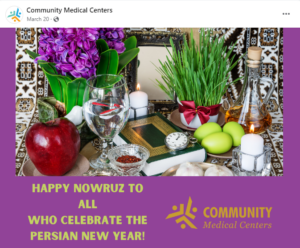
CMC celebrates its large and diverse patient population in holidays and commemorations (CMC Facebook)[/caption]
CMC works to support the staff’s well-being, too. It collaborates with the external consultancy
Symbio Strategy to survey employees each month, using three questions that take the pulse of where staff members are at in terms of their satisfaction with their workplace environment and other relationships in their life. At the height of the pandemic, more than 70 percent of the 900 or so CMC employees responded to the survey, but that figure now stands at around 50 percent, says Apu. Staff meet as a group to discuss the questions, with the aid of an in-house behavioral health facilitator. It’s a safe environment where coworkers can process losses, raise concerns, and express their needs for support.
That’s just one way CMC engages with its employees around well-being. The center also works with an independent counseling service that provides staff with internal behavioral health services they can sign up for; there are groups on wellness and mindfulness and workshops staff can attend, as well as individual counseling and group therapy support. The service, which is available through telehealth, is called
Flourish, and is offered through
EM Consulting, which specializes in employee mental health and has staff members who have worked at FQHCs and understand the stresses and challenges of such an environment. About 100 staff members use this confidential service.
The consulting agency was founded by Elizabeth Morrison, a social worker with decades of experience. “Elizabeth has helped CMC move forward in our understanding of experience through the lens of the staff, patients, and community,” says CMC CEO Christine Noguera. “She completely understands the health center world and develops training programs tailored to our needs, time restraints, and competing priorities. Staff who participate in her team’s workshops are wowed by them." Flourish is a strength-based approach designed to support employees with burnout, work/life harmony, parenting difficulties, mental health struggles, life transitions, and difficult decisions.
[caption id="attachment_29956" align="alignleft" width="456"]
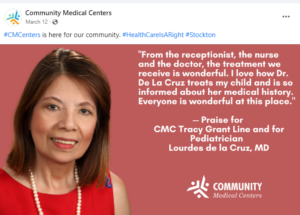 At CMC everyone from the providers to the receptionist plays a strong role in making patients feel safe and welcome (CMC Facebook)
At CMC everyone from the providers to the receptionist plays a strong role in making patients feel safe and welcome (CMC Facebook)[/caption]
In terms of hiring, Apu says they want the health center’s staff to reflect the community in all ways, and that includes bringing on people with lived experience. In addition to hiring staff who have experience with childhood adversity, for example, the organization has revised its hiring policies to make it easier to employ people who have interacted with the justice system. “Changing policy to reflect changing attitudes around hiring people who can related to specific patient communities” has been an important undertaking, says Apu.
Given the lingering pandemic and its aftermath, along with the number of patients screening positive for ACEs, Apu says there is always a need for more behavioral health clinicians. He currently employs 29; there are job listings for another four -- and, he says, he could easily keep an additional four behavioral health professionals gainfully employed. As he says, “The need is great; CMC strives to fill the void.”
Lessons learned
Identify an ACEs champion. Sometimes that individual may already be on staff and working as a medical assistant or community health worker. The position requires a multi-tasker with keen attention to detail, good networking skills, and excellent follow-through, who is also comfortable communicating with patients and providers alike. It is also important to look for someone with cultural competency and ties to the community.
Offer staff consistent wellness support services. Trauma-informed care is taxing, and staff burnout and attrition is real. Take care of health care teams by providing services that support their mental wellness.
Partner with community-based organizations. Find allies in the community who share a passion for public health and building relationships with residents. These groups may be able to access people who would otherwise fall through the cracks, especially those who aren’t connected to any health organization or clinic.
Secure buy-in at every level of an organization. Trauma-informed care works better when everyone from the community health worker to the CEO understands the importance of screening patients for ACEs.
Make follow-up a vital part of the program. Screening patients is a first step to addressing ACEs. Some patients who screen positive need connection to community-based organizations, specialist providers, and other services and resources to address the root causes of their circumstances. In addition, it’s not enough to assist patients in crisis; patients need continuity of care.
Community Medical Centers’ is part of the Resilient Beginnings Network, a learning program that promotes trauma- and resilience-informed pediatric care so that 100,000 young children and their caregivers in the San Francisco Bay Area have the support they need to be well and thrive. The Resilient Beginnings Network is powered by the Center for Care Innovations, an Oakland-based nonprofit that fosters health equity and innovation in the health care safety net, and by Genentech Corporate Giving.  Young patients at CMC visit a table the health center has set up (CMC Facebook)[/caption]
The pandemic upended Community Medical Centers’ plans to roll out an adverse childhood experiences (ACEs) screening program in California's Central Valley, famed as the "food basket of the world" for its produce. As in many other safety net clinics, screening “was a rollercoaster,” says CMC’s chief of behavioral health Alfonso Apu. The initial rollout was halted by the COVID-19 pandemic, staff shortages, and a soaring need for behavioral health services, as well as the retirement of a longstanding manager and difficulty finding the right employee to lead the charge for trauma screening.
But after a few months, an internal champion for the program emerged, and the Central Valley-based center was able to start making significant progress tackling this critical program area. Maria Moreno, a pediatric medical assistant in CMC’s Vacaville clinic for a dozen years, seized the opportunity to bring the program back on track as the trauma informed case manager and care coordinator. Kudos to Moreno, says Apu, who adds that she has been a stable, central force since taking over in February 2022.
To begin with, Moreno was already well known to the healthcare team and families alike. On the clinic end, she is familiar with CMC’s procedures, workflows, and electronic health record (Next Gen Healthcare) which was a huge help in launching ACEs screening on site. (CMC uses both NextGen’s internal ACEs screener and PEARLS—which stands for Pediatrics Adverse Childhood Experiences (ACEs) and Related Life Events Screener).
[caption id="attachment_29980" align="alignright" width="454"]
Young patients at CMC visit a table the health center has set up (CMC Facebook)[/caption]
The pandemic upended Community Medical Centers’ plans to roll out an adverse childhood experiences (ACEs) screening program in California's Central Valley, famed as the "food basket of the world" for its produce. As in many other safety net clinics, screening “was a rollercoaster,” says CMC’s chief of behavioral health Alfonso Apu. The initial rollout was halted by the COVID-19 pandemic, staff shortages, and a soaring need for behavioral health services, as well as the retirement of a longstanding manager and difficulty finding the right employee to lead the charge for trauma screening.
But after a few months, an internal champion for the program emerged, and the Central Valley-based center was able to start making significant progress tackling this critical program area. Maria Moreno, a pediatric medical assistant in CMC’s Vacaville clinic for a dozen years, seized the opportunity to bring the program back on track as the trauma informed case manager and care coordinator. Kudos to Moreno, says Apu, who adds that she has been a stable, central force since taking over in February 2022.
To begin with, Moreno was already well known to the healthcare team and families alike. On the clinic end, she is familiar with CMC’s procedures, workflows, and electronic health record (Next Gen Healthcare) which was a huge help in launching ACEs screening on site. (CMC uses both NextGen’s internal ACEs screener and PEARLS—which stands for Pediatrics Adverse Childhood Experiences (ACEs) and Related Life Events Screener).
[caption id="attachment_29980" align="alignright" width="454"] Maria Moreno, a CMC medical assistant and childhood trauma screening champion[/caption]
In terms of patients and parents, the bilingual Moreno is a familiar, friendly, and welcoming face. She offers continuity, calmness and a sense of safety in a frequently fast-paced clinic environment. She’s able to interact in English and Spanish during ACEs screening at multiple touchpoints: with front office staff at the reception desk, medical assistants on the floor, in the provider’s room and the behavioral health staff’s office, and with patients and their families in the waiting area and beyond. For both the clinic and families, it is a win-win.
Maria Moreno, a CMC medical assistant and childhood trauma screening champion[/caption]
In terms of patients and parents, the bilingual Moreno is a familiar, friendly, and welcoming face. She offers continuity, calmness and a sense of safety in a frequently fast-paced clinic environment. She’s able to interact in English and Spanish during ACEs screening at multiple touchpoints: with front office staff at the reception desk, medical assistants on the floor, in the provider’s room and the behavioral health staff’s office, and with patients and their families in the waiting area and beyond. For both the clinic and families, it is a win-win.
 CMC care team (L-R) :Shami Prasad-Clerve, NP ; Maria Moreno, medical assistant; Alexa Garcia, medical assistant; and Verenice Rodriguez, medical assistant[/caption]
“I think our pediatricians really bought in since the beginning -- as an agency we are committed to trauma-informed care concepts,” says Apu, noting that it was more a question of having the right resources in place to do screening and follow-up. Having Moreno on board removed barriers to implementing the screening and post-screening care, and her new role reinforced the importance and value of this work.
Some health team members, though, initially expressed concern that ACEs screenings might be akin to opening a can of worms. They worried they would be ill-equipped or too short on time to be able to support patients who screened positive. “I tell them: don’t worry about that, a patient’s’ can of worms has been open for years -- you’re not opening anything,” Apu says. “You’re providing that patient an opportunity to actually feel safe and bring a concern to light.” The intent is to create an environment where people feel comfortable about not only screening but talking about their trauma, he adds. “Patients that come to CMC understand that if they have a behavioral health issue or toxic stress, we’re here to help them, normalize their issues and reduce any stigma.”
CMC care team (L-R) :Shami Prasad-Clerve, NP ; Maria Moreno, medical assistant; Alexa Garcia, medical assistant; and Verenice Rodriguez, medical assistant[/caption]
“I think our pediatricians really bought in since the beginning -- as an agency we are committed to trauma-informed care concepts,” says Apu, noting that it was more a question of having the right resources in place to do screening and follow-up. Having Moreno on board removed barriers to implementing the screening and post-screening care, and her new role reinforced the importance and value of this work.
Some health team members, though, initially expressed concern that ACEs screenings might be akin to opening a can of worms. They worried they would be ill-equipped or too short on time to be able to support patients who screened positive. “I tell them: don’t worry about that, a patient’s’ can of worms has been open for years -- you’re not opening anything,” Apu says. “You’re providing that patient an opportunity to actually feel safe and bring a concern to light.” The intent is to create an environment where people feel comfortable about not only screening but talking about their trauma, he adds. “Patients that come to CMC understand that if they have a behavioral health issue or toxic stress, we’re here to help them, normalize their issues and reduce any stigma.”
 Community Medical Centers was originally started in the late 1960s to serve the farmworker community of the Central Valley (Shutterstock)[/caption]
Community Medical Centers, which began as a farmworker clinic in the 1960s, has grown into a network of 27 neighborhood health centers serving over 111,000 patients in San Joaquin, Solano, and Yolo Counties, making the organization one of the area’s largest safety net providers. The federally qualified health center (FQHC), which historically served mostly migrant agricultural workers and their families, offers integrated medical, dental, behavioral health, and supportive services, using a model that puts the patient at the center of the care team. Today, the clinics also serve a significant unhoused population, as well as community members with substance use disorders and/or severe mental illness. Almost all CMC patients are low-income; one third need care in a language other than English and many are uninsured.
As part of CCI’s Resilient Beginnings Network (RBN), the center is working to bolster its trauma-informed care with pediatric patients in the Central Valley. CMC is currently doing pediatric ACEs screenings at four locations, including in Stockton, Lodi, and Vacaville, where Moreno works. The center screens patients from newborn to 18 years old at all appointments: well and sick in-person visits.
For patients who aren’t able to come in, miss appointments or no show, Moreno schedules a telehealth call for both screenings and follow up. If a family needs help with the screening questionnaire, Moreno offers support. With the care team staff, she makes sure coworkers follow through on documentation in the electronic health record (EHR). Moreno follows up with positive patients with introductions to behavioral health providers and other specialists and connects patients to support services. To date, CMC has screened more than 2,500 pediatric patients. Almost 22 percent of those patients screen positive for at least one ACE, according to the organization.
[caption id="attachment_29959" align="alignright" width="445"]
Community Medical Centers was originally started in the late 1960s to serve the farmworker community of the Central Valley (Shutterstock)[/caption]
Community Medical Centers, which began as a farmworker clinic in the 1960s, has grown into a network of 27 neighborhood health centers serving over 111,000 patients in San Joaquin, Solano, and Yolo Counties, making the organization one of the area’s largest safety net providers. The federally qualified health center (FQHC), which historically served mostly migrant agricultural workers and their families, offers integrated medical, dental, behavioral health, and supportive services, using a model that puts the patient at the center of the care team. Today, the clinics also serve a significant unhoused population, as well as community members with substance use disorders and/or severe mental illness. Almost all CMC patients are low-income; one third need care in a language other than English and many are uninsured.
As part of CCI’s Resilient Beginnings Network (RBN), the center is working to bolster its trauma-informed care with pediatric patients in the Central Valley. CMC is currently doing pediatric ACEs screenings at four locations, including in Stockton, Lodi, and Vacaville, where Moreno works. The center screens patients from newborn to 18 years old at all appointments: well and sick in-person visits.
For patients who aren’t able to come in, miss appointments or no show, Moreno schedules a telehealth call for both screenings and follow up. If a family needs help with the screening questionnaire, Moreno offers support. With the care team staff, she makes sure coworkers follow through on documentation in the electronic health record (EHR). Moreno follows up with positive patients with introductions to behavioral health providers and other specialists and connects patients to support services. To date, CMC has screened more than 2,500 pediatric patients. Almost 22 percent of those patients screen positive for at least one ACE, according to the organization.
[caption id="attachment_29959" align="alignright" width="445"] CMC patients have high praise for their providers, (CMC Facebook)[/caption]
This kind of thoughtful and thorough care coordination extends beyond the trauma-informed ACEs criteria and includes social needs that patients have difficulties addressing.
Many families who screen positive for ACEs, explains Apu, also have unmet needs— for food, housing, transportation, employment, and/or health insurance. They may need assistance around domestic or intimate partner violence or access to recovery services. Moreno tries to help with it all. “The feedback we get from patients is often along the lines of ‘nobody has ever asked me that before,’” says Apu. “They don’t feel judged. They feel like they’re being treated as human beings, and Moreno builds relationships and develops a bridge with these families to help get their needs met.”
CMC patients have high praise for their providers, (CMC Facebook)[/caption]
This kind of thoughtful and thorough care coordination extends beyond the trauma-informed ACEs criteria and includes social needs that patients have difficulties addressing.
Many families who screen positive for ACEs, explains Apu, also have unmet needs— for food, housing, transportation, employment, and/or health insurance. They may need assistance around domestic or intimate partner violence or access to recovery services. Moreno tries to help with it all. “The feedback we get from patients is often along the lines of ‘nobody has ever asked me that before,’” says Apu. “They don’t feel judged. They feel like they’re being treated as human beings, and Moreno builds relationships and develops a bridge with these families to help get their needs met.”
 Patient feedback collected by CMC attests to the power of the relationships its staff has developed with patients (CMC Facebook)[/caption]
Of course, it takes a village to screen for ACEs. Not to mention financing. In September 2022, CMC received just under $500,000 in a grant from UCLA-UCSF ACEs Aware Family Resilience Network, in collaboration with the Office of the California Surgeon General , Department of Health Care Services , and PHI’s Population Health Innovation Lab.
The organization was one of 25 California clinics funded with the goal of increasing the capacity of Medi-Cal primary care clinics, community-based organizations, and Medi-Cal managed care plans to address toxic stress in local communities. (Three other RBN cohort members received a million each in funding: Marin Community Clinics, School Health Clinics of Santa Clara County, and UCSF Benioff Children’s Hospital in Oakland).
The funds will help support ACEs training and education with the goal to increase the number of providers who can screen community members beyond the walls of the clinic setting -- and, importantly, be eligible for reimbursement for these screenings. CMC collaborates with community-based organizations, including Little Manila Rising, which provides services for Filipino Americans and other marginalized members of the South Stockton area, and Catholic Charities Diocese of Stockton, which works closely with the Latino community.
Such partnerships are crucial: These organizations are already engaged in the field with community members who may not be CMC patients, and they have language and cultural connections which make them a trusted resource among specific populations. In addition, the goal of this new grant is to have 12 of the 27 CMC sites administering ACEs screening and referrals, says Apu.
[caption id="attachment_29961" align="alignright" width="350"]
Patient feedback collected by CMC attests to the power of the relationships its staff has developed with patients (CMC Facebook)[/caption]
Of course, it takes a village to screen for ACEs. Not to mention financing. In September 2022, CMC received just under $500,000 in a grant from UCLA-UCSF ACEs Aware Family Resilience Network, in collaboration with the Office of the California Surgeon General , Department of Health Care Services , and PHI’s Population Health Innovation Lab.
The organization was one of 25 California clinics funded with the goal of increasing the capacity of Medi-Cal primary care clinics, community-based organizations, and Medi-Cal managed care plans to address toxic stress in local communities. (Three other RBN cohort members received a million each in funding: Marin Community Clinics, School Health Clinics of Santa Clara County, and UCSF Benioff Children’s Hospital in Oakland).
The funds will help support ACEs training and education with the goal to increase the number of providers who can screen community members beyond the walls of the clinic setting -- and, importantly, be eligible for reimbursement for these screenings. CMC collaborates with community-based organizations, including Little Manila Rising, which provides services for Filipino Americans and other marginalized members of the South Stockton area, and Catholic Charities Diocese of Stockton, which works closely with the Latino community.
Such partnerships are crucial: These organizations are already engaged in the field with community members who may not be CMC patients, and they have language and cultural connections which make them a trusted resource among specific populations. In addition, the goal of this new grant is to have 12 of the 27 CMC sites administering ACEs screening and referrals, says Apu.
[caption id="attachment_29961" align="alignright" width="350"] CMC celebrates its large and diverse patient population in holidays and commemorations (CMC Facebook)[/caption]
CMC works to support the staff’s well-being, too. It collaborates with the external consultancy Symbio Strategy to survey employees each month, using three questions that take the pulse of where staff members are at in terms of their satisfaction with their workplace environment and other relationships in their life. At the height of the pandemic, more than 70 percent of the 900 or so CMC employees responded to the survey, but that figure now stands at around 50 percent, says Apu. Staff meet as a group to discuss the questions, with the aid of an in-house behavioral health facilitator. It’s a safe environment where coworkers can process losses, raise concerns, and express their needs for support.
That’s just one way CMC engages with its employees around well-being. The center also works with an independent counseling service that provides staff with internal behavioral health services they can sign up for; there are groups on wellness and mindfulness and workshops staff can attend, as well as individual counseling and group therapy support. The service, which is available through telehealth, is called Flourish, and is offered through EM Consulting, which specializes in employee mental health and has staff members who have worked at FQHCs and understand the stresses and challenges of such an environment. About 100 staff members use this confidential service.
The consulting agency was founded by Elizabeth Morrison, a social worker with decades of experience. “Elizabeth has helped CMC move forward in our understanding of experience through the lens of the staff, patients, and community,” says CMC CEO Christine Noguera. “She completely understands the health center world and develops training programs tailored to our needs, time restraints, and competing priorities. Staff who participate in her team’s workshops are wowed by them." Flourish is a strength-based approach designed to support employees with burnout, work/life harmony, parenting difficulties, mental health struggles, life transitions, and difficult decisions.
[caption id="attachment_29956" align="alignleft" width="456"]
CMC celebrates its large and diverse patient population in holidays and commemorations (CMC Facebook)[/caption]
CMC works to support the staff’s well-being, too. It collaborates with the external consultancy Symbio Strategy to survey employees each month, using three questions that take the pulse of where staff members are at in terms of their satisfaction with their workplace environment and other relationships in their life. At the height of the pandemic, more than 70 percent of the 900 or so CMC employees responded to the survey, but that figure now stands at around 50 percent, says Apu. Staff meet as a group to discuss the questions, with the aid of an in-house behavioral health facilitator. It’s a safe environment where coworkers can process losses, raise concerns, and express their needs for support.
That’s just one way CMC engages with its employees around well-being. The center also works with an independent counseling service that provides staff with internal behavioral health services they can sign up for; there are groups on wellness and mindfulness and workshops staff can attend, as well as individual counseling and group therapy support. The service, which is available through telehealth, is called Flourish, and is offered through EM Consulting, which specializes in employee mental health and has staff members who have worked at FQHCs and understand the stresses and challenges of such an environment. About 100 staff members use this confidential service.
The consulting agency was founded by Elizabeth Morrison, a social worker with decades of experience. “Elizabeth has helped CMC move forward in our understanding of experience through the lens of the staff, patients, and community,” says CMC CEO Christine Noguera. “She completely understands the health center world and develops training programs tailored to our needs, time restraints, and competing priorities. Staff who participate in her team’s workshops are wowed by them." Flourish is a strength-based approach designed to support employees with burnout, work/life harmony, parenting difficulties, mental health struggles, life transitions, and difficult decisions.
[caption id="attachment_29956" align="alignleft" width="456"] At CMC everyone from the providers to the receptionist plays a strong role in making patients feel safe and welcome (CMC Facebook)[/caption]
In terms of hiring, Apu says they want the health center’s staff to reflect the community in all ways, and that includes bringing on people with lived experience. In addition to hiring staff who have experience with childhood adversity, for example, the organization has revised its hiring policies to make it easier to employ people who have interacted with the justice system. “Changing policy to reflect changing attitudes around hiring people who can related to specific patient communities” has been an important undertaking, says Apu.
Given the lingering pandemic and its aftermath, along with the number of patients screening positive for ACEs, Apu says there is always a need for more behavioral health clinicians. He currently employs 29; there are job listings for another four -- and, he says, he could easily keep an additional four behavioral health professionals gainfully employed. As he says, “The need is great; CMC strives to fill the void.”
At CMC everyone from the providers to the receptionist plays a strong role in making patients feel safe and welcome (CMC Facebook)[/caption]
In terms of hiring, Apu says they want the health center’s staff to reflect the community in all ways, and that includes bringing on people with lived experience. In addition to hiring staff who have experience with childhood adversity, for example, the organization has revised its hiring policies to make it easier to employ people who have interacted with the justice system. “Changing policy to reflect changing attitudes around hiring people who can related to specific patient communities” has been an important undertaking, says Apu.
Given the lingering pandemic and its aftermath, along with the number of patients screening positive for ACEs, Apu says there is always a need for more behavioral health clinicians. He currently employs 29; there are job listings for another four -- and, he says, he could easily keep an additional four behavioral health professionals gainfully employed. As he says, “The need is great; CMC strives to fill the void.”

